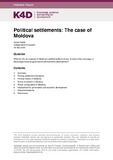| dc.contributor.author | Haider, Huma | |
| dc.date.accessioned | 2022-06-16T14:17:04Z | |
| dc.date.available | 2022-06-16T14:17:04Z | |
| dc.date.issued | 2022-05-06 | |
| dc.identifier.citation | Haider, H. (2022). Political Settlements: The Case of Moldova. K4D Helpdesk Report 1143. Institute of Development Studies. DOI: 10.19088/K4D.2022.065 | en |
| dc.identifier.uri | https://opendocs.ids.ac.uk/opendocs/handle/20.500.12413/17479 | |
| dc.description.abstract | The new elite in post-1991 independent Moldova gradually captured state institutions, while internal drivers of reforms have generally been weak. Civil society has had limited effectiveness; and the media is largely dominated by political and business circles (BTI, 2022). The Moldovan diaspora has emerged in recent years, however, as a powerful driver of reform. In addition, new political parties and politicians have in recent years focused on common social and economic problems, rather than exploiting identity and geopolitical cleavages. These two developments played a crucial role in the transformative changes in the presidential and parliamentary elections in 2020 and 2021, respectively.1 The new Moldovan leadership has experienced many challenges, however, in achieving justice and anti-corruption reforms—the primary components of their electoral platform—due to the persistence of rent-seeking and corruption in the justice sector (Minzarari, 2022).
This rapid review examines literature—primarily academic and non-governmental organisation (NGO)-based—in relation to the political settlement of Moldova. It provides an overview of the political settlement framework and the political history of Moldova. It then draws on the literature to explore aspects of the social foundation and the power configuration in Moldova; and implications for governance and inclusive development. The report concludes with recommendations for government, domestic reformers, Moldovan society, and donors for improving inclusive governance and development in Moldova, identified throughout the literature. This report does not cover political settlement in relation to Transnistria. | en |
| dc.description.sponsorship | Foreign, Commonwealth and Development Office (FCDO) | en |
| dc.language.iso | en | en |
| dc.publisher | Institute of Development Studies | en |
| dc.relation.ispartofseries | K4D Helpdesk Report;1143 | |
| dc.rights.uri | https://www.nationalarchives.gov.uk/doc/open-government-licence/version/3/ | en |
| dc.subject | Governance | en |
| dc.subject | Participation | en |
| dc.subject | Politics and Power | en |
| dc.title | Political Settlements: The Case of Moldova | en |
| dc.type | Helpdesk | en |
| dc.rights.holder | © Crown copyright 2022 | en |
| dc.identifier.doi | 10.19088/K4D.2022.065 | |
| dcterms.dateAccepted | 2022-05-06 | |
| rioxxterms.funder | Default funder | en |
| rioxxterms.identifier.project | K4D | en |
| rioxxterms.version | VoR | en |
| rioxxterms.versionofrecord | 10.19088/K4D.2022.065 | en |
| rioxxterms.funder.project | 0986883a-6d0f-4bb8-9c46-5e0682934d65 | en |

